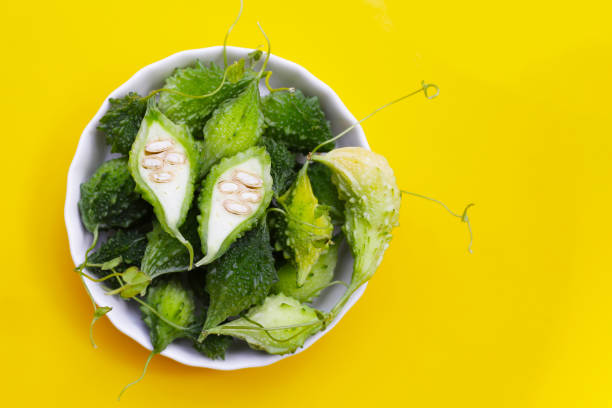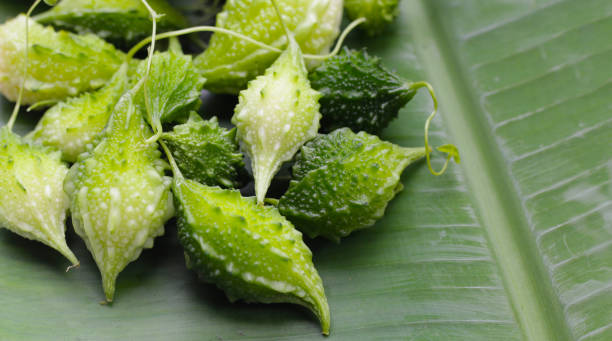Health Benefits of Bitter Melon-Balsam Pear

What is Bitter Melon?
Bitter melon, also called Momordica charantia, is a tropical vine widely grown in Asia, Africa, and the Caribbean for its edible fruit. It’s bumpy, cucumber-shaped, and—true to its name—has a distinct bitter taste.
Common Names Around the World
Depending on where you are, bitter melon might be called “karela” (India), “ampalaya” (Philippines), “nigauri” (Japan), or “balsam pear” (Caribbean). No matter the name, its health benefits remain impressive.
Cultural and Culinary Significance
From Indian curries to Chinese stir-fries, bitter melon is deeply rooted in traditional cuisines. But beyond flavor, it’s treasured for its healing properties in Ayurvedic, Traditional Chinese, and African medicine.
Nutritional Profile of Bitter Melon
Key Vitamins and Minerals
Bitter melon is rich in:
- Vitamin C – boosts immunity
- Vitamin A – good for skin and eyes
- Folate – essential during pregnancy
- Potassium – helps manage blood pressure
Phytochemicals and Antioxidants
It contains powerful plant compounds like:
- Charantin – known to lower blood sugar
- Momordicin – contributes to bitterness and health properties
- Polypeptide-p – acts like insulin in the body
Caloric and Macronutrient Content
Low in calories, fat, and carbs—but high in fiber—bitter melon is perfect for anyone looking to maintain or lose weight.
Bitter Melon and Blood Sugar Control

Natural Insulin Mimicking Effects
One of bitter melon’s most celebrated uses is its natural blood sugar-lowering effect. Compounds like polypeptide-p function like insulin, helping move glucose into cells.
Research on Type 2 Diabetes
Several studies show bitter melon can:
- Reduce fasting blood sugar
- Improve insulin sensitivity
- Help regulate post-meal sugar spikes
How to Consume for Glucose Support
Drinking bitter melon juice on an empty stomach is a popular remedy. Others prefer capsules or incorporating it into meals 2–3 times a week.
Benefits for Digestive Health
Supports Healthy Digestion
Feeling bloated or sluggish? Bitter melon’s natural bitterness triggers enzymes and bile, which help break down food more efficiently.
Helps with Constipation and Gut Cleanse
Its high fiber content acts like a broom for your intestines, pushing out waste and toxins. No more sluggish gut!
Promotes Gut Microbiome Balance
Bitter melon encourages the growth of healthy gut bacteria—essential for immunity, mood, and overall health.
Weight Management and Fat Loss
Low-Calorie, High-Fiber Properties
Bitter melon is a diet-friendly food—low in calories but leaves you feeling full, thanks to its fiber.
Appetite Regulation and Cravings
Struggling with cravings? Bitter melon regulates blood sugar, which can reduce those spikes that lead to sugar binges.
How It Supports Metabolic Rate
Its compounds can subtly boost metabolism and help your body burn more fat, especially belly fat.
Immune System Boosting Properties
Vitamin C and Antiviral Effects
Packed with vitamin C, bitter melon strengthens immune cells and helps your body fight off infections like the flu and the cold.
Traditional Use in Immune-Boosting Remedies
In traditional medicine, bitter melon tea is a go-to remedy for fevers, infections, and immune weakness.
Anti-inflammatory and Antioxidant Benefits
Combatting Oxidative Stress
Bitter melon is loaded with antioxidants like catechin, gallic acid, and epicatechin, which fight free radicals.
Reducing Inflammation Naturally
Joint pain? Chronic swelling? Bitter melon’s anti-inflammatory properties may help ease conditions like arthritis and gout.
Skin and Hair Health
Clears Acne and Skin Conditions
Its antibacterial properties make bitter melon juice a great home remedy for acne, eczema, and psoriasis.
Strengthens Hair and Fights Dandruff
Bitter melon juice or oil can be applied to the scalp to treat dandruff, itchiness, and promote healthy hair growth.
Liver Detoxification and Health
Traditional Use for Liver Cleansing
For centuries, bitter melon has been used to detoxify the liver and improve bile flow.
Modern Studies and Evidence
Modern science confirms bitter melon supports liver enzymes and may help prevent liver damage caused by alcohol or medications.
Heart Health Benefits
Lowering Blood Pressure
The potassium and antioxidants in bitter melon relax blood vessels and support heart rhythm.
Improving Cholesterol Profiles
Regular consumption may reduce “bad” LDL cholesterol and increase “good” HDL levels, keeping your arteries clean.
Potential Anti-Cancer Properties
Research into Cancer-Fighting Compounds
Lab studies suggest bitter melon extracts can:
- Slow cancer cell growth
- Induce cancer cell death
- Prevent tumor spread in certain cancers
How It May Inhibit Tumor Growth
Compounds in bitter melon appear to cut off the energy supply to tumors, slowing their growth.
Hormonal and Reproductive Health
Effects on Fertility and Menstrual Health
Bitter melon is known to regulate hormones and may help with irregular periods or fertility challenges.
Male and Female Hormonal Balance
Its influence on insulin also affects sex hormones, which can improve issues like PCOS or low testosterone.
How to Add Bitter Melon to Your Diet

Cooking Methods and Recipes
You can:
- Stir-fry it with onions and eggs
- Stuff it with ground meat
- Cook in curries
- Roast or pickle it
Juicing, Teas, and Capsules
For strong medicinal effects, try:
- Fresh bitter melon juice
- Bitter melon herbal tea
- Supplements (capsules or extracts)
Precautions and Side Effects
Who Should Avoid Bitter Melon
Not for everyone! Avoid if you are:
- Pregnant or breastfeeding
- On insulin or blood sugar meds (unless supervised)
- Prone to low blood sugar (hypoglycemia)
Possible Interactions and Dosage Guidelines
Too much can cause stomach upset or hypoglycemia. Stick to:
- 1 small bitter melon a day
- 50-100 ml juice
- 1-2 capsules (follow label)
Conclusion

Bitter melon might not win a popularity contest for taste—but when it comes to health benefits, it’s a clear winner. From lowering blood sugar and aiding digestion to boosting immunity and fighting inflammation, this humble vegetable packs a powerful punch. Add it to your weekly meals or take it as a supplement—your body will thank you.
Frequently Asked Questions (FAQs)
1. Can I eat bitter melon raw?
Yes, but it’s very bitter. Most people juice it or cook it lightly to reduce the bitterness.
2. How often should I consume bitter melon for diabetes?
2–3 times a week is a good start, but always consult your doctor if you’re on medication.
3. Are there any side effects?
Too much bitter melon may cause stomach upset or dangerously low blood sugar.
4. Is bitter melon safe during pregnancy?
No, it’s best avoided during pregnancy due to its effects on uterine contractions.
5. What’s the best way to reduce its bitterness?
Soak sliced bitter melon in salt water for 10–15 minutes before cooking.
